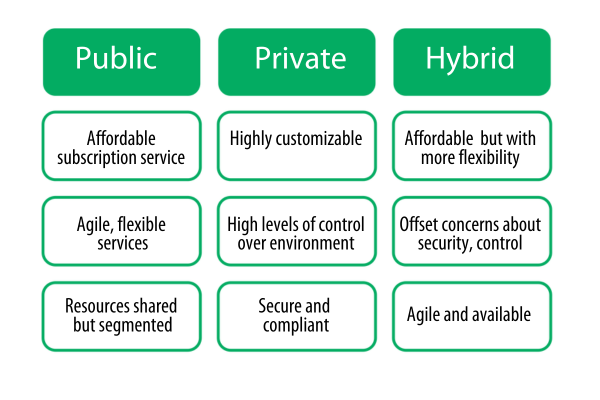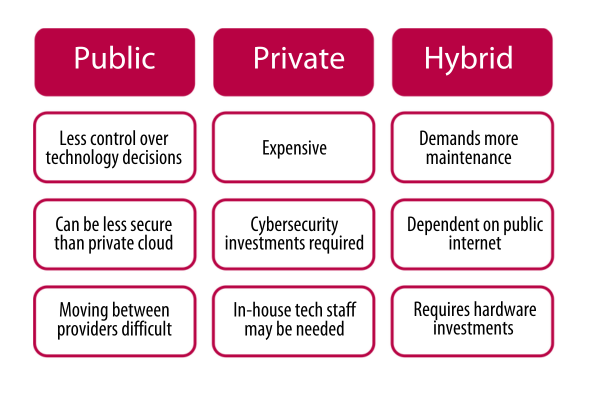As we near the start of 2025, it's the perfect time to consider transitioning to or expanding your use of cloud computing. Many small to midsized organizations don't take full advantage of the many benefits of cloud, such as scalability, cost savings, enhanced cybersecurity, and reliable business continuity – to name a few. They aren't alone. Cloud-based IT management vendor Auvik released research earlier this year showing that most businesses remain split between cloud-based and on-premises infrastructure.
Often, organizations need professional support to design cloud infrastructure and plot the journey toward a more inclusive cloud computing approach – without that guidance, the process can be overwhelming. That's where Exigent can help. To start, let's consider the pros and cons of the three cloud options: public, private, and hybrid.
Assessing Business Needs for Cloud Adoption
Not sure if cloud can help your organization? Well, first, the answer is yes. But how much and where is another question. For midsized businesses, cloud can deliver some game-changing benefits:
- Reduced IT Costs: You will spend less on purchasing and maintaining hardware by using public cloud, and because cloud uses a consumption model, you will pay only for the resources used. This can help smaller organizations optimize their IT spending.
- Scalability Support Growth: If your organization is gearing up for growth, cloud resources can be scaled up or down easily – without buying excess hardware. With cloud scalability, your burgeoning business can enable better collaboration, more agility, and fast growth alongside cost efficiency.
- Remote Workforce: Cloud apps and collaboration tools offer access from any location with an internet connection, a huge advantage with today's preference for remote work. Plus, with work synced across devices through the cloud, real-time collaboration is simple.
- Business Continuity: Cloud providers often tout "five-nines" availability, meaning they guarantee 99.999% uptime of their services. With geographic and technical redundancies built into offerings, cloud can provide service during disruptions, aid in reliable business backup and recovery, and provide stability in your organization's infrastructure.
- Enhanced Cybersecurity: Early in cloud computing's history, businesses were leery of cloud due to security concerns. In reality, cloud providers invest heavily in enterprise-class cybersecurity as well as physical access control for data centers to deliver on cybersecurity best practices that meet even the most stringent compliance regulations.
Evaluating Cloud Providers and Hybrid Options
Before adding or expanding cloud computing, be certain you understand the three options – public, private, or hybrid – and the pros and cons of each. While some organizations focus on cost savings, others must contend with compliance requirements and other complications. Each business is unique, so invest the time to fully compare the options before making any decisions.
Public Cloud: Popular cloud platform services multiple organizations (tenants) and leverages the internet to deliver servers, storage, and other cloud resources and services. Public clouds are hosted by cloud service providers – often a well-known vendor such as Microsoft or AWS – and provide flexible, subscription-based access to cloud services.
Private Cloud: Private cloud platforms provide highly customized environments tailored for a single tenant. Hosted either within an enterprise data center or through a cloud services provider that hosts the cloud in another location, a private cloud is defined as having all services, hardware, software, and other resources designated for a private network used by only one organization.
Hybrid Cloud: This approach commonly uses a mix of public cloud and on-premises resources. Hybrid cloud solutions have grown increasingly popular in the aftermath of COVID when many organizations had to scramble to blend their on-premise environments with a public cloud option to support the rapid shift to remote work.


For a more in-depth comparison, download our quick guide
Cloud Computing Best Practices
It's clear to see why most businesses opt to lean on their managed services provider or another expert when they decide to fully embrace cloud. With multiple options delineated by some subtle differences, having a cloud and network infrastructure expert to guide your decisions is a must. At Exigent, that guidance comes from our technical advisors, who collaborate with each client to create a unique technology roadmap. During that process, we work with your organization to evaluate current cloud solutions, consider potential alternatives or solutions to augment those investments, and then discuss what your business needs for peace of mind. Maybe an inexpensive public solution delivers the benefits you need – or perhaps your healthcare or legal practice demands high availability and cutting-edge cybersecurity from a more custom cloud solution.
Either way, as your technology partner, we'll work alongside your team to weigh the pros and cons and plot an affordable journey toward cloud – from picking the right option to designing your migration path to avoid disruption.
Schedule a consultation with Exigent, and we can discuss your specific cloud questions.


